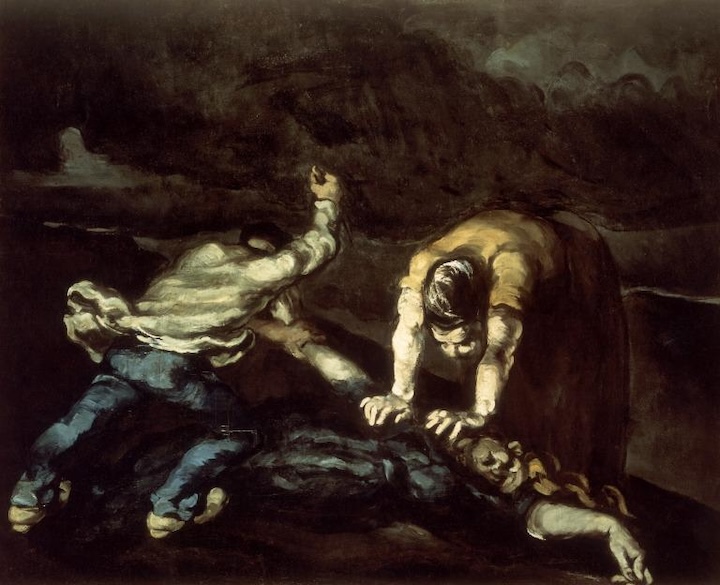In 1937, the British poet W.H. Auden wrote a tribute to the Left that was then in the middle of the Spanish Civil War. Like many intellectuals of that day, Auden rooted for the “Republic,” highlighting crimes of the Nationalists while ignoring or excusing the Republic’s brutality and its record – before and during the War – persecuting Catholics who are, even today, the majority of Spaniards.
His poem, “Spain,” is his tribute to the Left. But there’s one line in it that stands out for me. Auden acknowledges:
“Today. . .The conscious acceptance of guilt in the necessary murder”
The necessary murder.
If there’s a distinguishing characteristic of the 20th century, it was mass murder. A century that began with illusions that human “progress” made armed conflict a thing of the past (an illusion still perpetuated as late as 1928 in the Kellogg-Briand Pact) perpetrated not one but two world wars.
It also gave birth to two of the most barbaric and murderous totalitarianisms that not only murdered millions of people, but they also accepted murder as a political policy. The “civilized” world had sanctioned murder as a tool of statecraft.
By 1937, Nazism had already embraced “the necessary murder” as a way of saving the Third Reich. Dachau had already been in business for four years.
That same year, Russian Communism was in the middle of Stalin’s Great Purge. But it was not just Stalin. By 1937, Russians had suffered two decades of murder: the Bolshevik Revolution, the Civil War, and Leninist cleansing. “Necessary murder” was vital to the Soviet state.
And “necessary murder” was necessary to the Spanish Left’s Republic.
Do we truly appreciate the inflection points represented by the idea that (a) murder can be “necessary” and (b) even made a part of state policy?
What does it say about civilization when the keepers of culture – like great poets – write about “necessary murder” and are praised for it?
Auden later turned to Christianity and was embarrassed enough by the early line to omit the poem from anthologies of his work during his lifetime. It eventually came back with the desire for an intact opera omnia.

But it wasn’t just Auden who was corrupted. Anna Swir (neé Anna Świrszczyńska) was a Polish writer who has enjoyed something of a posthumous renaissance in the West thanks to Nobel laureate Czesław Miłosz’s promotion of and interest in her poetry (e.g., Building the Barricade, Talking to My Body). In her later years in Poland (she died in 1984), she was primarily a children’s author.
Back in the 1950s, Świrszczyńska was a communist hack. Her first postwar dramas were paeans to the dictatorship of the proletariat. Some might excuse that as a necessity of survival. But, in February 1953, Świrszczyńska was one of 53 signatories of a declaration by the Kraków chapter of the Union of Polish Literary Writers against three priests sentenced to death after a show trial that framed them as American spies. The capital sentences were later commuted to life imprisonment, but the fact remains – 53 writers, including Świrszczyńska and Nobel laureate Wisława Szymborska – signed a politically-induced declaration supporting calls to execute people for political reasons. Necessary judicial murder?
And no need to go back to the 20th century to find such examples. David Benatar is a South African philosopher who has written Better Never to Have Been: The Harm of Coming into Existence, an Oxford University Press book published in 2006 that argues human extinction would be a good thing. Unlike Auden and Swir, Benatar does not advocate “necessary murder.” In fact, he admits the barrier to his idyllic world of non-human existence is that you’d need murder to achieve human extinction and he can’t overcome that moral hurdle.
I believe it was Princeton’s Robert George who refused to acknowledge the legitimacy of the “debate” engendered by Benatar or by Francesca Minerva and Alberto Giubilini in their 2013 Journal of Medical Ethics article advocating for post-birth euthanasia of some newborns. The authors were branded “barbarians,” much to the chagrin of votaries of “academic freedom” votaries for whom murder is now a legitimate topic for discussion.
Polish philosopher Zbigniew Stawrowski has rightly observed that we live in a world of “sleek barbarians,” barbarians who wear power suits instead of animal skins, using “rights” and “law” rather than clubs to kill.
In the wake of the Dobbs decision, pressures to “shout your abortion,” and efforts to exclude in principle any discussion of reasons why abortion should or should not be legal, show that the concept of the “necessary murder” is alive and well.
The problem for the advocates is not the concept but the open admission. Some killings are “necessary” but calling things by their right names is just so complicating: “necessary evacuations” or “necessary surgical interventions” is so much more palatable, and even provides a patina of “scientific” or “medical” respectability.
Murders for socio-economic reasons pose no insurmountable barrier: just redefine “health” (as Proposition 1, soon to be voted on in Ohio does).
It’s only the bravest of the brave or the tenured partisans who are honest enough to admit abortion ends a life, but then argue that murder is “necessary” just because the child’s mother wants it. Most find such candor alienates the ambivalent middle and so prefer the “semantic gymnastics” required for the wholesale justification of abortion.
In one sense, who knew how far ahead of his time the young W.H. Auden was, in concept if not in language? The “necessary murder” could also be called the Caiaphas Principle. (John 11:50)
__________















